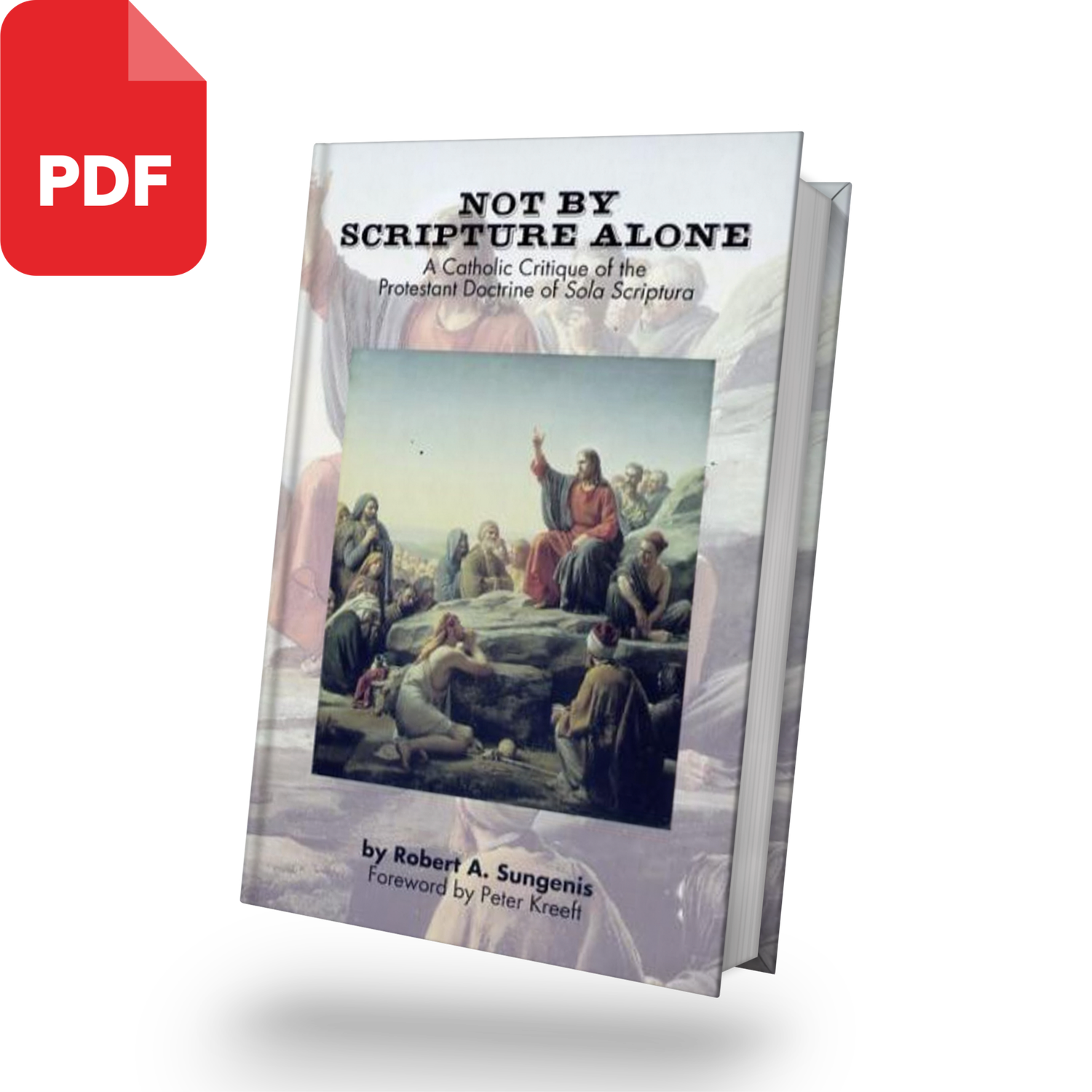
Not By Scripture Alone: A Catholic Critique of the Protestant Doctrine of Sola Scriptura *2nd Edition, 2019* (PDF Download)
***THIS IS THE 2ND EDITION 2019***
This work rebuts every possible argument that Protestants have made for Sola Scriptura from a biblical and epistemological view. It also provides a wealth of selections from the Church Fathers which clearly refute the dangerous 'bible only' doctrine introduced in the Sixteenth century. This book is a veritable handbook for those wishing to answer objections to those who claim that there is no authority outside of the bible.
Not By Scripture Alone is one of the first books produced by modern Catholic scholars that addresses the contention of Protestants beginning in the 16th century, which claims that the Bible, alone, is the sufficient and final authority in all areas of faith and morals. Its over 600 pages, with extensive footnotes and appendices; examination of the original Greek and Hebrew; critique of past and present Protestant theologians; citing of major patristic Fathers, the medieval theologians, the Ecumenical Councils and the Catholic catechism, make this one of the finest and most thorough books ever made on the subject of Scripture, Tradition and Authority. Is the Bible the "last word" or should we look to the Church and its Tradition as additional infallible authorities on earth? Find out in this exciting book which challenges Protestant and Catholic to reexamine what he believes, or what he should believe.
Not By Scripture Alone contains the Nihil Obstat and Imprimatur of the Catholic Church. Foreword by Dr. Peter Kreeft. 616 pages, paperback.
Contributors include: Philip Blosser, Ph.D. (Lenoir-Rhyne College); Robert Fastiggi, Ph.D. (St. Edwards University); Joseph Gallegos (Catholic Apologist); Patrick Madrid (Editor:Envoy Magazine); Rev. Mitchell Pacwa, Ph.D. (University of Dallas); Mark Shea (Author: By What Authority); Rev. Peter Stravinskas, Ph.D. (Editor: The Catholic Answer); Robert Sungenis (Author: Not By Faith Alone)
Peter Kreeft, Ph.D. (Boston College) says, "Not By Scripture Alone is the single, most important, systematic, logical, sustained, direct, multifaceted treatment of this central issue that I know of."
Chapter 1
Sola Scriptura: A Blueprint for Anarchy
By Patrick Madrid
It's funny. For five centuries, Protestants have intimidated, cowed, browbeaten, flustered, put to flight, trodden down, bullied, vexed, and knocked the wind out of countless unwary Catholics by using the "Bible only" approach to religious arguments.
Actually, it's not funny, but it is ironic, because it shouldn't be this way. Catholics need not be disturbed (and our hope is that after reading this book they won't be) when a Protestant attacks the Catholic Church using Scripture as his cudgel. That's because the standard Protestant objections to Catholicism are all based on a fallacy -- sola scriptura(Latin: by Scripture alone) -- a fallacy that can be easily refuted by informed Catholics.
As Catholic apologists mount a concerted attack on sola scriptura, Protestant apologists have been scrambling to find new ways to bolster their case for sola scriptura. A spate of new books defending this most vulnerable of Reformation slogans have been printed in recent years. 1 This is due, I believe, to the recent dramatic rise in apologetics works by Catholics, e.g., articles, books, conversion testimonies, seminars, and debates specifically aimed at rebutting the Protestant claim of sola scriptura. This book you're now holding is the latest in that series of critiques, a joint effort by several Catholic apologists aimed at providing in a single volume the major outlines of the patristic, theological, exegetical, and epistemological evidence that demonstrates that sola scriptura is indefensible.
Sola scriptura is a grave theological error that has led countless souls to doctrinal ruin, a purely human construct that all Christians who love and obey God's Word should reject as a tradition of men that nullifies and distorts that Word.
Protestant writer Don Kistler, remarking on the state of the debate between Catholics and Protestants on sola scriptura, said, "The slugfest goes on."2 Indeed it does, and the Protestant side is not getting the better of the exchange. The fire Catholics have been directing on sola scriptura is having visible, positive effects. Many converts to the Catholic Faith from evangelicalism report that their seeing sola scriptura disintegrate in the face of rigorous biblical, historical, and logical scrutiny, was the key to their conversion to the Catholic Church. They were shocked at the discovery that Christ did not teach sola scriptura, the apostles and Church Fathers, did not teach it and, most ironically, the Bible does not teach it.
Catholics need to realize just how untenable sola scriptura is. The first step is to see the tremendous advantage gained by asking Protestants to prove sola scriptura from the Bible. Instead of being put on the defensive when purgatory or the Real Presence or some other doctrine is challenged by Protestants demanding that they be proven from Scripture, 3 the Catholic should begin by asking, "where does the Bible teach sola scriptura?"
This book focuses on the most devastating flaws of sola scriptura: (a) It is unhistorical, (b) It is unbiblical, and (c) It is utterly unworkable. This first chapter is designed to give you a "macro" look at the issues at stake. Later chapters will delve deeply into specific aspects, but to get ourselves properly oriented, let's stand back and look at the big picture.
Endnotes
1) Cf. Don Kistler, general editor of Sola Scriptura! The Protestant Position on the Bible (Morgan, PA: Soli Deo Gloria, 1995); James White, The Roman Catholic Controversy (Minneapolis: Bethany House, 1996). Norman Geisler and Ralph E. MacKenzie, Roman Catholics and Evangelicals: Agreements and Differences (Grand Rapids: Baker, 1995).
2) Ibid., p. 277
3) Scriptural evidence, whether explicit or implicit, can indeed be adduced for any given Catholic teaching, but those apologetics discussions are not our focus here.

